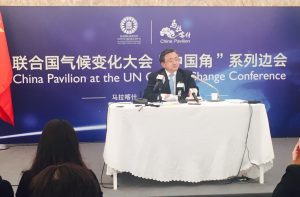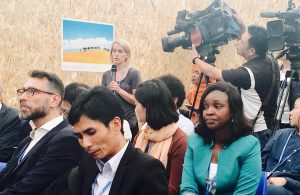Bella
I attended the press held by Chinese delegation today. China maintains that what role the US is going to play remains to be seen in the following months. So that we should wait and see. As the largest developed country in the world, the US will be essential to tackle climate change. Countries all over the world including China hopes that the US continue to play the extremely important leading role in implementation of Paris Agreement.
Although we have to wait, China expressed the willingness to enhance the cooperation with the US. Actually president Xi telephoned Mr Donald Trump last week and said cooperation between “the largest economy” and “the largest developed country” will be essential.
One journalist from Wall Street Journal asked about what do China think about the comment that “climate change is a hoax made up by the Chinese”. Zhenmin LIU, the Vice Minister of Foreign Affairs responded that “The climate change issue was first studied in the 1980s by EU countries and the US. When the IPCC was established, China was still not aware of climate change and negotiation. It is not possible that China intended to do this”.

Jeremy
COP22 is turning out to have a lot more energy and excitment than I previously expected! Even with the thought of a President-Elect hanging over everyone here, there is a certain electricity in the air.
Watching Secretary John Kerry speak today reemphasized this point. His personal passion for this issue might be unmatched between the senior U.S. government officials. He ended his speech by quoting Winston Churchilll which really summed up the general thoughts of the week so far, “It’s not always enough that we do our best; sometimes we have to do what is required.”
Adam
My third day at COP22 has been just as captivating as the first two. The diversity of topics addressed through both formal proceedings and side events is fascinating, and it provides an inspiring glimpse into how many smart and passionate people are pushing the envelope on climate action. In the span of just one day, I sat in on sessions exploring frameworks for sustainable transport, increased ambition through transparency, future directions for carbon markets, and more. Throughout these meetings, I noticed a common thread: parties (including nations, non-state actors, businesses, and so on) must work both within and outside the UNFCCC to realize the goals of the Paris Agreement. This sentiment was underscored during a conversation our delegation had with two experts in climate policy and the negotiations process. They emphasized that the value of the Paris Agreement extends far beyond the accord itself. Rather, it’s equally about the signal it sent regarding international commitment to climate action and ambition across all levels of society. This year’s COP has made it clear that Paris catalyzed new levels of activity related to adaptation and mitigation beyond the UNFCCC. I think this is one of the most important takeaways from the COP, especially for those of us still worried about the uncertain future of U.S. climate policy.

Ryan
Today i went to several side events that focused on the use of Article 6 of the Paris Agreement. Article 6 allows parties to use internationally transferable mitigation outcomes (ITMOs) to meet their NDC targets. ITMOs are just a fancy way of saying that countries can set up carbon markets, better know as cap and trade systems in order to help reduce emissions are efficiently as possible.
Countries and subnational governments around the world are harnessing the power of carbon markets, either in the form of cap and trade or carbon taxes, to reduce their emissions. Today i learned that New Zealand issued a declaration in support of carbon markets during COP21 that was support by 17 other nations including the United States. During the side event the United Kingdom environment minister announced their support for the declaration as well. China, the world’s biggest polluter, recently announced that they would be starting a national emissions trading system. If efforts like these can go from the national to international level it could go a long way to efficiently reducing global carbon emissions to where they need to be.
Diana Tarrazo
Today was another long and busy day! I started my morning bright and early with my client, and got to hear from Karen Florini, the Deputy Special Envoy for Climate Change at the US Department of State. She spoke a bit about the new administration coming in, but maintained that we cannot know what will happen until we know who is going to be appointed. She also stressed that the Paris Agreement will be moving forward with or without the United States, and that the governing question has become whether the United States will stay at the table to negotiate it.
After offering us this insight, she spoke to the evolution of the role of subnational actors in the United States, noting that in recent years it increasing dramatically, with these actors coming to the fore. She pointed to the momentum states created for the Obama Administration. However, she also said that she thinks that getting subnational actor recognition in the Paris Agreement (outside of the Declaration) is unlikely. In spite of that, she stressed that states and other subnational authorities should put their best foot forward, and that the work they are doing can still be far reaching. It seems like every side event and discussion I attend has at least some mention of subnational actors–even in events where I wouldn’t necessarily expect it. Seeing the increasing role that states and cities are playing with respect to climate change mitigation and adaptation has definitely given me optimism for the coming years.